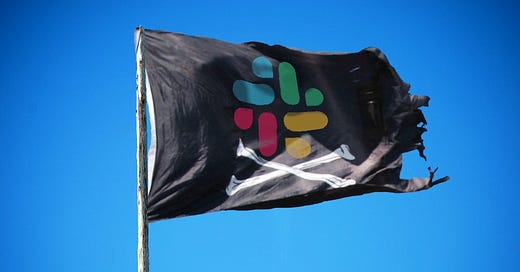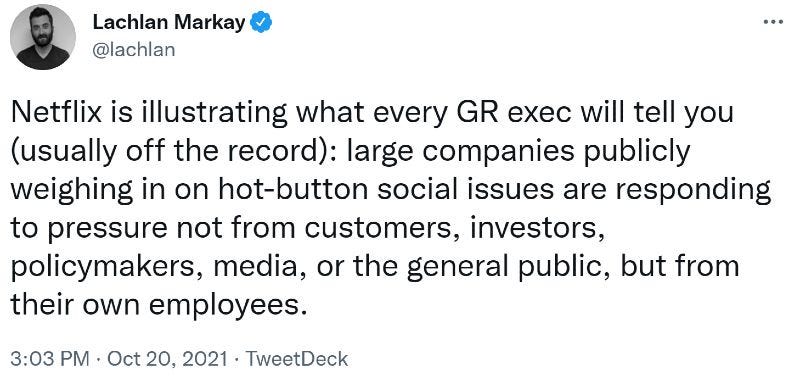Slack in the Age of Employee Mutiny
ATTICA!!! (shocked-face emoji) ATTICA!!! (shocked-face emoji)
As far as I can tell, non-labor-issue employee mutinies are a recent phenomena. I can’t think of examples from the past; I don’t know of any walkouts over Rush Limbaugh’s ‘90s TV show or a movement inside the Washington Post to purge Charles Krauthammer. I thought I remembered a revolt by Good Humor workers but upon further reflection, that was just a Smashing Pumpkins video.
But employee mutinies are suddenly all the rage! Within the past 16 months, there have been two grassroots revolts at the New York Times (over James Bennett and Don McNeil), and also ones at New York Magazine, Gimlet’s Reply All, Apple, Google, Coinbase, and Basecamp. Plus, of course, Netflix is in turmoil over Dave Chappelle’s recent special. The nadir of this dustup — and possibly of all human existence — happened at an employee walkout on Wednesday. The altercation is below; it might actually be the best possible argument against fighting climate change, because I defy you to watch this clip and not think “Humanity’s done, burn it all down.”
When companies aren’t experiencing a Twerp Putsch, they’re living in fear of one. Dread of a kiddie coup was an obvious driver behind the odd corporate social justice statements of last summer, a time when everyone wondering “What does Little Debbie Snack Cakes think about police violence?” had all their questions answered. Axios reporter Lachlan Markay recently tweeted the thing that all of us, on some level, already knew (n.b. “GR” = “government relations”, basically the political side of PR):
What’s causing this? Why does every company suddenly feel like the moment in a sci-fi movie right before the robots rise up? There are several things you could point to: the increased prevalence of the “silence is violence” mentality, the development of a coddling attitude among management, or a new generation that values bringing their “whole selves” to work. Any or all of these variables might be at play. But I’d like to offer another possible explanation: Slack. Slack is messaging software that’s suddenly everywhere in the white-collar world — 600,000 offices use Slack. Several of the mutinies I listed above started on Slack. I think it’s entirely possible that Slack is fanning the flames of a social dynamic that makes employee revolts more likely.
Slack, if you’re not familiar, is software invented by Satan to make sure work never ends. It’s 25 percent e-mail, 25 percent instant messaging, 25 percent dystopian tracking software, and 25 percent phone circle populated by the meanest girls in your high school. Each new message — which comes to both your computer and phone, so it’s basically WUPHF! from The Office — is accompanied by an unassuming “ssssshkk-kk!-kk!” that users come to dread the way Squid Game contestants came to dread “The Blue Danube Waltz”. Though, you can mute notifications: Just go to “settings” > “notifications” > “never get promoted”, and turn the slider to “on”.
Conversations on Slack are divided into “channels”. So, you might have channels called, say, “Marketing Team”, “Dog Owners”, or “Party Planning”. Though, better names would be “People Aggressively Looking For Their Next Job”, “NSFW Clips”, and “Gang Up On Beth”. Before long, these channels will divide your office into factions that will make the Middle East look like a cuddle orgy. The channels make it easier than e-mail to slide in and out of groups, and it’s also different from e-mail in that it’s more rapid-fire. It resembles an actual conversation, albeit a conversation in which everyone’s talking at once, and you have to know that a hastily-typed “esriuoslt” means “seriously”.
Slack has legitimate uses, specifically: shit talk. The interface allows you to quickly and seamlessly create Machiavellian alliances that will shred your office’s social fabric to ribbons. You can create channels secretly and invite people privately, which provides the cover you need to build your sleeper cell of disgruntled peons. Of course, the whole thing is stored on a server, so you’re also handing your employer blackmail material that will be used against you when the shit hits the fan.
As is the case within any group, the loudest voices dominate. People who agree with those voices speak up, and those who disagree keep quiet or leave. This is how groupthink develops. Social media’s interactive functions (like the “like” button) turbocharge groupthink, and Slack has that function in the form of emojis. People can respond to a message with an emoji — more emojis = more social credit. It’s deeply pathetic what humans will do for a thumbs-up emoji, but apparently, our beliefs can be altered by a little yellow hand. To my eternal shame, I once thumbs-upped “OMG This Is Us comes back tonight SO EXCITED!!!” because I just wanted to be part of the group.

It’s easy to see how political discussions, in particular, can gain momentum fast in that environment. And political discussions centered around identity will grow fastest of all. Speaking as a white liberal: If you think I would ever, in a billion lifetimes, contradict a co-worker from a marginalized group speaking about an issue that directly affects that group, then you are out of your goddamned fucking mind. Even I, who has been known to piss on a third rail from time to time (especially now that I’m independent), am going to respond to literally anything that person says with as many thumbs-up and hands-clapping emojis as the software will allow. The person could say “as a trans woman, nothing’s more important to me than being able to blame my subway farts on a homeless guy” and I will react to that statement like it’s the motherfucking “I Have a Dream” speech.
It’s hard to think of what would slow down a revolt centered on identity issues once it gets going. Are overwhelmingly-progressive employees going to tap the breaks on a movement ostensibly benefitting a marginalized group? Seems unlikely. Are the quieter members of a Slack channel going to stand up to the vocal ones? That’s not their MO. Will people swallow their frustration out of respect for management? Nobody on Earth likes their boss. The biggest limiting factor, in many cases, is probably fear of consequences. But of the many revolts we’ve seen, only Coinbase and Basecamp (by far the two smallest companies) said “Okay, here’s the severance package you can take.” All the others acquiesced or muddled through.
We’re increasingly aware of how software affects our politics. The idea that Twitter and Facebook are driving polarization is, by now, a banal observation. It seems likely that Slack is affecting the work world in similar ways. It facilitates the formation of groups and enhances the ability of passionate voices within those groups to drive the conversation. Combined with the other dynamics I’ve mentioned — a viewpoint that sees inaction as literal violence, a generation that feels strongly about bringing their political views (not to mention their dogs) to work — periodic revolts seem almost inevitable.
I’m agnostic as to whether these revolts are good or bad. It really depends on the revolt. Maybe employees at Philip Morris in the ‘60s should have staged a walkout, and maybe they thought about it, but, being smokers, didn’t want to climb the stairs. Regardless, building a movement through a months-long whisper campaign is a radically different project than whipping up a frenzy on Slack in a day or a week. Old-school union organizers would have killed for that kind of organizing capability (though, to be fair, old-school union organizers would kill for just about anything).
It’s yet to be seen if the era of the Twerp Putsch is transitory or permanent. It seems unlikely that whatever white-collar nerdery is next up to bat will hire a bunch of old-school union busters and start cracking skulls. That, after all, would be a whole HR thing. But Slack is ascendant, so it will probably continue to shape the social dynamic within companies, which is to say: It will continue to basically re-create the conditions of a sailing ship, in which the crew is crammed together out of earshot of the captain. In that environment, the occasional mutiny seems all but inevitable.
***POLL FOR NEXT WEEK***
I'd like the next column to be about...
1. Why narratives are so powerful in shaping how we see the world [VOTE FOR THIS]
2. Why talented artists sometimes make absolute garbage [VOTE FOR THIS]
3. How Republicans should have to own our lack of an immigration policy [VOTE FOR THIS]






John mcwhorter has been calling the whole woke left a religion for years now. He’s not the only one.
The fun part about it is that it always seemed like we were all just being metaphorical to the outside. “Oh they mean it’s like a religion not that it’s an actual religion.”
Well to those people I can now offer the woman shaming chimes and screaming “repent motherfucker” as my strongest evidence yet that this entire mentality is identical. IDENTICAL. To Puritanism.
You know, this is interesting. I left an office environment to stay home with my kids a little over 10 years ago. At that time I worked in an office that was quite diverse actually, but there were more women than men. Several of the women I worked with were quite open and explicit about their bisexuality. At the time I certainly could have contacted HR and said I was Uncomfortable. But it didn’t even really occur to me to do so. The only time I ever talked to HR it was about how I felt my supervisor was unfairly treating me as responsible for a project issue.
Weirdly, it seems like NOW the people who would say that something makes them uncomfortable would actually be told to shut up, if what makes them uncomfortable is talking politics at work or being pressured to support social issues they disagree with or simply don’t care about.